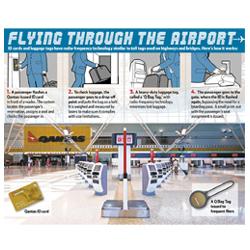How Airlines are saving time and money with RFID
posted on: 24 May, 2018 | 04:08:54 PM by ibc
There are few inconveniences that are more annoying than lost luggage. Last year alone, 23.1 million bags were mishandled, according to SITA’s 2016 Baggage Report. The resulting passenger frustration and headaches for the airlines has given rise to an array of new baggage tracking systems based on RFID technology.
In April of this year, Delta rolled out automated tracking of luggage using RFID tags to replace barcode scanning on the 120 million bags it handles per year. Delta anticipates that by the end of this year, RFID tracking will allow passengers to get real-time notifications of where their bags are located at all times throughout their journey.
The use of RFID technology for baggage handling not only addresses the problem of bags being lost when loaded on the wrong flight, but it also can speed up the process of pulling baggage from the cargo hold if a passenger has to suddenly de-plane.
Likewise, Alaska Airlines is piloting reusable RFID-enabled luggage tags for 500 members of its frequent flier program. The RFID reader and tag system is designed to shorten the check-in process by allowing passengers to skip the line, improving customer satisfaction and reducing bottlenecks.
In fact, the average passenger does not want to spend more than three minutes checking in their bag, according to the International Air Transport Association (IATA) annual Global Passenger Survey. Moreover, 81 percent of passengers want the ability to track their bags in real-time.
Yet, baggage tracking is not the only way that airlines are using RFID technology to save time and money.
Canada’s largest air cargo services provider, Air Canada Cargo, also is deploying a cargo management solution that uses RFID technology to track shipments in and out of its five hubs, as well as cargo-transfer stations worldwide. The installation of fixed RFID readers is expected to increase shipment visibility, improve operational efficiency and reduce mistakes.
Other aspects of airline operations can benefit from RFID as well, such as airline maintenance, repair and operations (MRO). Tracking of components and tools for MRO and manufacturing ensures that objects are not left behind that could become a hazard, while increasing operational efficiency. For example, companies like Cessna Aircraft Company use the Mojix STAR RFID reader in the manufacturing plant for real-time tracking, saving man hours hunting for specific components.
Today’s major airlines face a significant amount of pressure from passenger service demands, rising business costs and cut-rate competitors, forcing them to continually scan the horizon for new technologies and process improvements. Fortunately, the sky’s the limit on the ways the airline industry can leverage RFID technology to save money, increase customer satisfaction and improve operational efficiency.
